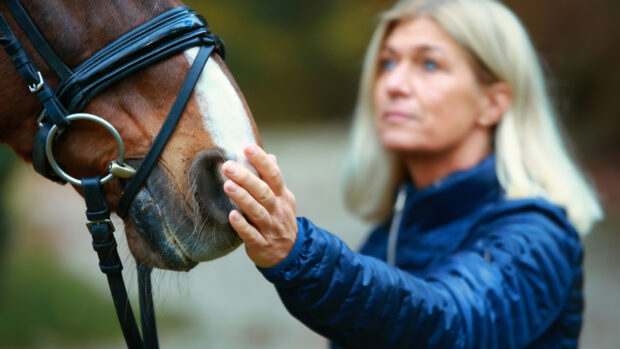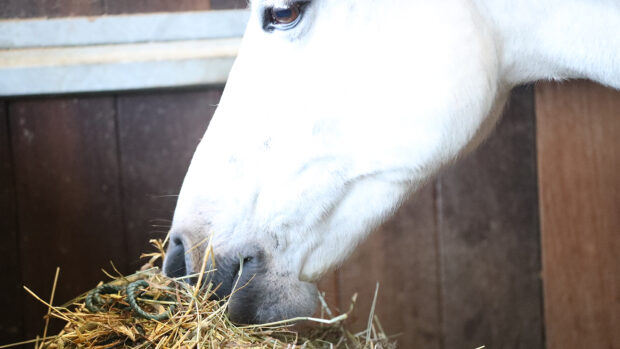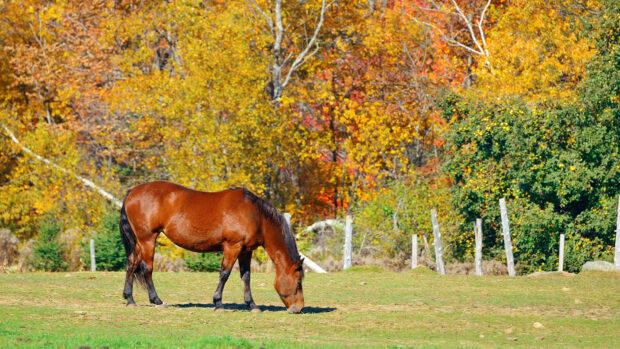It’s no secret that the population of older horses appears to be increasing, with many animals continuing to be active well into their 20s.
As your horse ages, he may become less efficient at digesting protein and fibre and the absorption of vitamins and minerals, particularly phosphorus, can be reduced. This means that you must consider modifications to his diet to ensure that he receives all of the necessary nutrients to keep him in good health.
A balanced diet that combines plenty of good quality forage with a low-starch concentrate feed, supplemented with an adequate supply of highly digestible quality protein, is pivotal to good health, and ensures that older horses can enjoy a long, healthy life.
Factors such as worming history, dental condition and the horse’s health status can all have an impact on the efficiency of digestion and absorption of nutrients from the diet.
If your horse has had worm infections before, this may have resulted in damage to the gut, which may have a negative impact on digestion and absorption. Likewise, as horses age, dental health can decline resulting in sharp, worn, loose or missing teeth. This means that he may find chewing more difficult and this can further reduce the efficiency of digestion. Many old horses can also develop diseases such as Cushing’s disease or laminitis, which will also influence dietary requirements.
Protein is an important part of every horse or pony’s diet. It provides a vital source of amino acids, which are the building blocks of protein manufacture and repair in every cell of the body. 21 different amino acids exist and, while some of these can be made by the body (non-essential amino acids), others cannot, so must provided in the diet (essential amino acids).
Why should the level of protein fed to older horses be increased?
As your horse gets older, he is likely to need a higher dietary protein intake compared to younger companions. This is because you need to compensate for the reduced efficiency of digestion, particularly with respect to protein.
It is important that dietary protein is readily digestible. Enzymes, found in the small intestine, are needed to break up the complicated structure of dietary protein in order to absorb its nutrient content, and so the small intestine is a key site for protein digestion and absorption. This process can become much more inefficient with age.
There are a number of amino acids such as lysine that cannot be manufactured by the horse and must be supplied in the diet. The level of these dietary essential amino acids can often be low in commonly used feed ingredients such as oats, barley, oatfeed and sugar beet. Supplementing your horse’s diet with a ready supply of bioavailable amino acids — such as Equitop Myoplast — can be a great support for protein metabolism in older horses. To find out more, visit www.equitop-myoplast.co.uk
Why is muscle mass and tone often reduced in older horses?
As horses grow older, they are likely to undertake less exercise, and this combined with age-related changes may lead to a gradual decline in muscle tone and mass.
At this stage in life, it becomes even more important to ensure that your horse’s nutrition accurately reflects their dietary requirements, not just in terms of volume, but also in balance and quality. Age-related reduction in the absorptive capacity of the gut also has to be considered when building a ration for your horse.
Ensuring your horse has a balanced supply of high quality and bio-available amino acids in their diet can help support the maintenance of good muscle mass in older horses, and supplementing your feed ration with Equitop Myoplast can help achieve that goal.
Why does forage for older horses need to be chosen carefully?
Maintaining adequate forage intake can be problematic in older horses, where dental health is compromised, or where underlying respiratory disease is present.
Despite this, forage is an important feature in your horse’s diet, as it helps to maintain digestive health and contributes to your horse’s overall well-being. Evidence suggests that your horse may be more likely to develop respiratory allergies as he gets older, including recurrent airway obstruction (formerly COPD). Good quality clean hay is therefore important to maintain respiratory health.
If you notice that your horse is finding chewing difficult, perhaps due to poor dentition, soaked or steamed hay can be easier, or short chop alfalfa can even be used to replace part of the hay allocation.
When your horse or pony has lost many of his teeth, eating hay is sometimes no longer possible and so other fibre sources such as soaked sugar beet or high fibre cubes can also be useful to ensure adequate fibre intake.
How can you ensure your older horse receives enough energy in his diet?
Even though your horse may still be being exercised regularly and competing, he is unlikely to need a ration that is high in carbohydrate or starch rich cereals.
Concentrate feeds that are high in digestible fibre and oil are often more appropriate for older horses as their level of exercise is reduced. Oil can provide your horse with more than twice as much energy per kg than carbohydrate from starches, which helps to maintain overall body condition. Oil is made up from fatty acids and certain fatty acids have been suggested to have a range of benefits in supporting good health in older animals.
Why may antioxidants help older horses?
Free radicals are highly biologically active by-products of many normal metabolic processes. But they are also implicated in the mechanisms of numerous diseases including respiratory and inflammatory joint disease.
Ensuring a rich supply of dietary antioxidants is good practice in older horses, as antioxidants are thought to help balance against the damaging effects of free radicals on tissues. A complex mixture of antioxidants are found naturally in plants and vegetables. Feed ingredients such as alfalfa, rosehip and ricebran contain a complementary mix of natural antioxidants that can be beneficial to your horse as part of a balanced diet.
Further information
To find out more, please visit www.equitop-myoplast.co.uk
Advice on the use of Equitop Myoplast or other therapies should be sought from your veterinary surgeon.
Further information available from Boehringer Ingelheim Vetmedica, Bracknell, Berkshire, RG12 8YS, UK.
Email: vetmedica.uk@boehringer-ingelheim.com
This is not a veterinary medicine which is subject to authorisation by the Irish Medicines Board. Date of preparation: August 2010. AHD 6441



